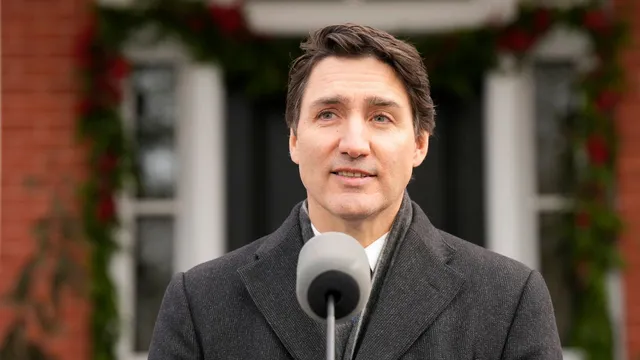
Justin Trudeau's exit leaves Canada in turmoil and division
2025-01-10 07:50- Justin Trudeau resigned as Prime Minister of Canada on January 6, 2025, after facing internal party pressures.
- His administration experienced declining popularity due to perceived failures in addressing inflation, housing, and immigration issues.
- The Liberal Party is now in a leadership struggle with key figures like Mark Carney and Chrystia Freeland being considered as possible successors.
Express your sentiment!
Insights
On January 6th, 2025, Justin Trudeau, the Prime Minister of Canada, officially announced his resignation following a prolonged period of speculation and growing political pressure. This decision came on the heels of a year that had seen Trudeau's popularity significantly decline, culminating in his party losing ground among supporters frustrated with its handling of key issues such as inflation, high housing costs, and challenges related to immigration. Despite leading the Liberal Party to three successive victories since 2015, recent developments had left Trudeau increasingly isolated, with internal pressures mounting within the party for a change in leadership. The Liberal Party now faces a complex leadership struggle, as potential successors like Mark Carney and Chrystia Freeland emerge as frontrunners to take the reins. With an election mandated to occur by October, the party is confronted with the difficult task of addressing Trudeau’s controversial legacy while gearing up for a campaign that must tackle pressing issues including a potential trade war, geopolitical uncertainties, and economic sluggishness that have plagued Canada. The political landscape in Canada is notably divided, with Trudeau's recent tenure characterized by increasing polarization among the electorate. Many voters express dissatisfaction with the current administration's performance, particularly in mitigating the costs of living and managing immigration effectively, leading to a crisis of confidence for the Liberal Party. As the party unravels, it will need to navigate these challenges while appealing to an electorate that has shown signs of frustration with the status quo. As Trudeau steps down, the fallout from his leadership will likely have enduring effects on Canadian politics, influencing not only the forthcoming election but also the future direction of the Liberal Party. The exit of Trudeau may pave the way for new leadership to reshape the party's platform and address the concerns of Canadians as they prepare for a pivotal electoral contest ahead.
Contexts
In the wake of Prime Minister Justin Trudeau's resignation from the Liberal Party, the political landscape in Canada is undergoing significant shifts. With the federal election on the horizon, potential contenders for the Liberal leadership are beginning to emerge, each with their unique backgrounds and visions for the country. Among these possible successors, Chrystia Freeland stands out, having made a name for herself as both the former deputy prime minister and finance minister. Her resumé, bolstered by her experience as a senior editor and international journalist, positions her as a formidable candidate. As the Liberal Party scrambles to regain favor in the polls, particularly against the Conservative leader Pierre Poilievre, the stakes are high. Recent surveys indicate a 15-point lead for the Conservatives, prompting Liberal insiders to speculate on who can effectively capture the support of disenchanted voters and restore the party's relevance. Many party members express a desire for new leadership, driven by the surging sentiment that Canadians want change. In this climate of uncertainty, the rise of new political entities like the Canadian Future Party adds another layer of complexity. Led by Dominic Cardy, the party aims to entice centrist voters frustrated by the ideological extremes of both the Liberals and Conservatives. Their centrist platform could potentially reshape the voting dynamic as the election approaches. As candidates prepare for the upcoming convention in Quebec City, excitement and anxiety fill the air. Each contender recognizes that not only does the future of their party hinge upon this moment, but also the fabric of Canadian democracy itself, as they vie for the opportunity to lead the nation through turbulent times.